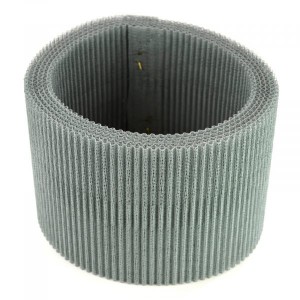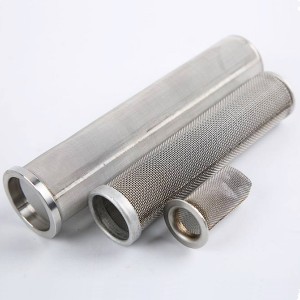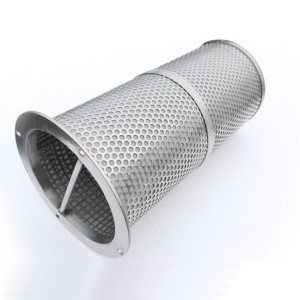Filter Material
Filter Material
-

Pleated Filter of Large Filter Area
There are mainly two kinds of materials for the pleated filter: stainless steel woven wire mesh and stainless steel sintered fiber felt which is made of stainless steel fiber by sintered in high temperature. Apart from the pleated filter, there is a type of filter protected by square perforated metal mesh or fastened by wire mesh in the surface, which is more strength and an ideal alternative to filter gas or liquid. Due to its pleated structure and raw material, pleated filter has the advantages of large filter area, smooth surface, firm structure, high porosity and good particle holding capacity, etc.
-

Good Quality Cylindrical Filter Elements
Cylindrical filter is also a common type of strainer. Different from filter discs, it is in cylinder shape. Cylindrical filters are made of various good quality raw materials including stainless steel wire, stainless steel woven wire cloth and carbon steel mesh, etc. In order to meet the customers’ growing demand, single layer and multilayer filters are available in every diameter and size. To enhance the filtration efficiency, multilayer filters may be consist of several different kinds of mesh. In addition to, cylindrical filter with an aluminum rim edge and filters with closed bottom are also supplied.
-

Cost Effective Filter Basket Material
Filter baskets are used to remove debris and contaminants from liquids. They are durable, cost-effective filters that can protect valuable equipment from potential damage. Different types of filter baskets can remove varying sizes of contaminants, depending on your needs. Basket strainers, for example, are used to remove larger particulates, while bag filter baskets are used to hold a filter bag to remove contaminants that are too small for the naked eye to see.
-

Sintered Mesh of High Filter Efficiency
Sintered mesh is manufactured from one layer or multiple layers of woven wire meshes by a “sintering” process. The single layer woven wire mesh is first roller flattened uniformly, to ensure good contact at the wire cross over points. Then the single layer or more layers of this calendered mesh are then laminated by special fixtures under mechanical pressure in high temperature furnace, which is filled with proprietary inset gas and the temperature is raised to a point where sintering (diffusion-bonded) occurs. After controlled-cooling process, the mesh has become more rigid, for all the contact points of individual wires bonding to each other. Sintering improves the characteristics of woven wire mesh through the combination of heat and pressure. Sintered mesh can be single layer or multiple layer, according to filtration need, one layer of perforated metal can be added to reinforce the whole structure.
Sintered mesh can be cut, welded, pleated, rolled into other shapes, like disc, plate, cartridge, cone shape. Compared with traditional wire mesh as filter, sintered mesh has prominent advantages, high mechanical strength, high permeability, low pressure drop, wide range of filtration rating, easy to backwash. Although the cost seems higher than traditional filter, but its long using life and excellent properties gain more popularity with clear advantages.
-

Various Shapes of Filter Disc
Filter disc, also named of wire mesh discs, is mainly made of stainless steel woven wire cloth, stainless steel sintered mesh, galvanized wire mesh and brass wire cloth, etc. It is mainly used to remove unwanted impurities from fluid, air, or solid. It can be made of single layer or multi layers filter packs, which can divide into spot welded edge and aluminum framed edge. Besides, it can be cut into various shapes, for example round, square, polygon and oval, etc. The discs are widely used in different walks of life, for example food and beverage filtration, chemical filtration, and water filtration, etc.
